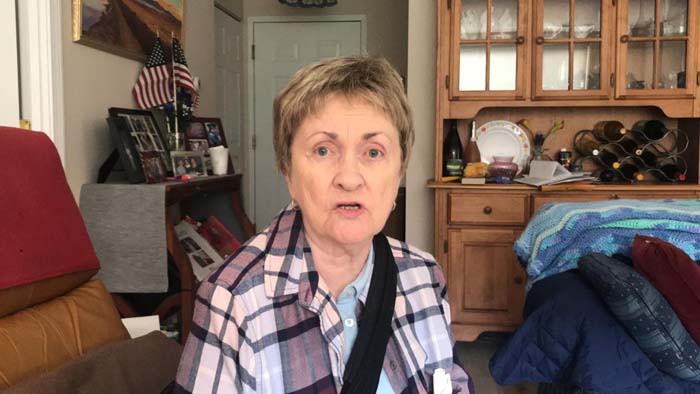Partisan divide, voter scramble mark midterm
Published 8:00 am Friday, November 2, 2018

- Peabody resident Gail Burke, 79, says she supports the president when it comes to issues important to her in the upcoming midterms.
Editor’s Note: This is the third in a series of quarterly reports this year by CNHI newspapers on the concerns and mood of voters in the battleground and heartland states that swept President Trump to victory in 2016.
Myra Baker of Mount Carmel, Pennsylvania, offers no apologies for her fire-in-the-belly support of President Donald Trump and stopping Democrats from rebounding against him in the Nov. 6 midterm elections.
Trending
Baker, 64, said she believes it is critical Pennsylvania voters strongly affirm Trump’s presidency as if he were on the ballot along with GOP candidates across the country.
“We need to keep the Congress Republican because even if you don’t like Trump’s personality, the economy is good, he destroyed ISIS and he is giving us fair trade deals,” she said. “If the Democrats control Congress they’ll try to stop everything Trump wants to do.”
Mary Lou Davis brushes off Baker’s fervor for Trump with a belief Pennsylvanians have come to their senses and will reject him this time in what the president defines as a referendum on his two years in office. Support for Republican candidates “is a vote for me” Trump frequently asserts to fire up voters.
Davis is a retired school teacher and founder of the political activist group “Indivisible Johnstown,” a barely blue city in red Cambria County. A turnaround from Pennsylvania’s narrow support of Trump in 2016 could occur as the state’s gerrymandered right-leaning rural congressional districts were reset by the State Supreme Court to give more representation to left-leaning urban-suburban areas of Pittsburgh and Philadelphia.
“Politics is personal,” said Davis. “The issues at the national level are going to impact every one of us.”
Those issues, Democrats contend, favor them due to concern over health care, education, immigration, taxes and income equality. Yet Republicans forecast their reach could go even wider and deeper than in 2016 because voters have a rosier outlook on the economy, national security and foreign policy.
Trending
Trump won the White House by riding an unexpected wave of working class voters in Rust Belt and swing states such as Pennsylvania, Ohio, Iowa, Michigan and Florida along with traditionally red states in America’s heartland.
CNHI’s continuing “Pulse of the Voter” series tracking political sentiment this year by more than 100 community newspapers in the Northeast, Midwest and the South indicates some Democratic gains in those states among marginal 2016 Trump voters, but few disillusioned core Trump supporters in traditional red states.
Both parties agree the winner of the midterm battle for Congress depends on voter turnout in the 2016 battleground states and others where the races are close for House and Senate seats. Democrats are counting on young voters, women and minorities.
All 435 House seats are on the midterm ballot, but only 50 of those are considered competitive. Democrats need to keep the 194 seats they now hold and win 24 more for majority control of the House. National polls rate their chances fair to good.
It would take a blue wave for Republicans to lose the Senate. While they own only a 51-49 edge now, 10 Democrat seats are up for grabs in states that Trump won. To gain control, Democrats need to hold those seats and pick off GOP seats in states like Nevada, Arizona and Texas. Pollsters predict that likely won’t happen.
The informal CNHI survey showed Trump – his conduct in office and his policies – occupy the foreground. He has stoked his core with an average of three political rallies a month this year, bashing the “crazy Democrats” in his traveling road show.
Republicans and Democrats anticipate higher voter turnout than usual for this midterm, in part, because of the contentious partisan fight over Trump’s appointment of Brett Kavanaugh to the Supreme Court. Democrats expect women voters will rally to their side; Republicans expect strong response from their base of conservatives, men and women.
Trent England, executive vice president of the Oklahoma Council of Public Affairs, said a gap in Republican voter motivation existed in his state until Senate Democrats fought to prevent Kavanaugh’s appointment with an eleventh hour sexual assault accusation by Christine Blasey Ford when both were in high school 35 years earlier.
“That enthusiasm gap seems to be eliminated by all this” harsh treatment of Kavanaugh by Senate Democrats, said England.
Trey Watson, spokesman for the Kentucky Republican Party, said Democrats foolishly used Ford’s allegation as a desperate gender ploy to derail Kavanaugh’s appointment. “The way the Democrats handled it has really fired up our base and gotten them excited to get out and vote,” said Watson.
Marisa McNee, spokeswoman for the Kentucky Democratic Party, sees the Kavanaugh controversy as a plus for her party among teachers. She said it “sort of collided” with their anger over unfair wages and other inequities.
“We’ve had people telling us they were infuriated by what they saw as the Republicans very rough treatment of Dr. Ford,” said McNee. “And also the way the president attacked her and the gloating by Mitch McConnell (GOP Senate president).” Trump publicly mocked Ford’s Senate Judiciary Committee testimony at a rally in Mississippi.
Elizabeth Gray, a Bucknell University student in Lewisburg, Pennsylvania, said the Kavanaugh hearings created a wakeup buzz among young voters. “Unless you are really into politics most people don’t think about what it really means until something happens,” said Gray. “My fear is that no one would care about this until Roe vs. Wade is overturned.”
In liberal Massachusetts, even Republican Gov. Charlie Baker takes issue with many of the president’s policies. Baker is expected to cruise to re-election despite accusations of traitor by Trump loyalists.
Gail Burke, 79, of Peabody, Massachusetts, isn’t deterred by the state’s deep blue tradition. She’s formed a group of conservatives at her retirement community called “We the People.” She also co-produces a public affairs show for cable access TV called “What’s Happening.”
Burke wants Democrat Sen. Elizabeth Warren held accountable by the voters for her leftist views, arguing that Warren is running for president before she’s even re-elected to the U.S. Senate. “It’s important for people to get more than one side of a story,” said Burke.
Sipping coffee at the only Dunkin’ Donuts in Athens, Alabama, George Anthony, 71, said what matters to voters of all ages is the economy. The retired utility worker said Trump’s deregulation of fossil fuel rules has created jobs and hope. “I know it is not good for the environment,” said Anthony. “But it is good for the economy because when people are working they are spending, buying homes and cars and things.”
Wayne Lagrone, 69, of Meridian, Mississippi, says both parties are moving to the left. “If you look at where the Democratic Party is today, you could much easier identify them as socialists,” he said. “And if you look at the Republican party, they’ve taken the position that was filled by the Democratic Party from 25 years ago. It’s left conservatives out in the cold.”
Then there’s Georgia, where voters are weighing whether to put a black woman in the governor’s office for the first time. Democrat Stacy Abrams is in a tight race with Republican Brian Kemp. The contest is as much over voting rights as policies.
Kemp is Georgia’s Secretary of State and has been criticized by Abrams for implementing strict voting rules to ostensibly combat fraud. Abrams has demanded he resign as the state’s chief election official, pointing to his disenfranchising of minorities and new voters that she needs to win. His office has suspended the voter registrations of 53,000 mostly black residents.
In the northern Georgia city of Dalton known as the carpet capital of the world, Hispanics represent 49 percent of the community. Zeucis and Liz Martinez moved there from Venezuela 30 years ago and describe themselves as Republicans. They said no Hispanic vote can be taken for granted, though Trump’s derisive language about Hispanic immigrants and the separation of children from their parents does not help the GOP.
They said Hispanics, many of them illegals, put down roots in Dalton long ago to work in the carpet mills, and had children in the U.S., many of whom can now vote. The parents fear deportation under the president’s zero tolerance immigration policy.
“We have to have strong borders. We have to protect our country,” said Zeucis Martinez. “I agree criminals need to be out.” But, he added, Trump and leaders of both parties need to pass laws that allows longtime undocumented immigrants who are “good families” to obtain citizenship and stay in the United States.
“Those kids and their parents came here to make a better life,” said Mrs. Martinez. “These kids can be the future of this country. If we hurt their future, we hurt our future.”
Bill Ketter is CNHI’s senior vice president for news. Contact him at wketter@cnhi.com.





